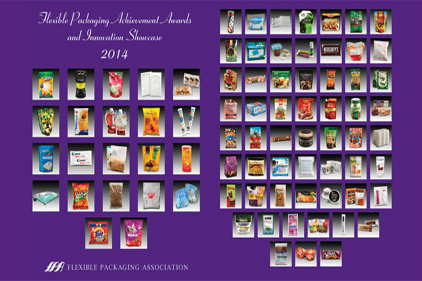FLEXIBLE PACKAGING ASSOCIATION | UPDATE
FPA Update: 2014 Flexible Packaging Association Annual Meeting

The 2014 Flexible Packaging Association Annual Meeting was held March 4-6, 2014 at the Fairmont Princess, Scottsdale AZ. Three hundred FPA members and guests participated in content-rich general sessions that focused on strategic business issues and the flexible packaging industry.
The FPA Achievement Awards
Twenty-two packages were recognized with Flexible Packaging Achievement Awards within one or more categories including Packaging Excellence, Printing Achievement, Technical Innovation and Environmental & Sustainability Achievement. The awards were presented during the Welcome Dinner & Flexible Packaging Achievement Awards Ceremony.
Session Take-aways
The Role of Private Equity in Funding Growth
Greg Myers, Managing Director, Mason Wells
Myers suggested that providing transition equity helps companies invest in growth and creates value. The key points of the flexible packaging market value include: growth, innovation and differentiation, stability through good management, and size. The current flexible packaging environment is strong for mergers and acquisitions driven by: a good stock market, high valuations, abundance of cheap debt, corporate balance sheets, a role in private equity and a recovering economy with less uncertainty.
Igniting Innovation
Lisa Bodell, founder of futureThink author of Kill the Company: End the Status Quo, Start an Innovation Revolution
This highly interactive session was geared to look at the future based on ‘emerging’ and framing trends that have not yet hit mainstream culture, and ways businesses gain strategic leverage around issues that are in theses stages of development. This proactive approach encourages businesses to look at trends in terms of helping shape consumer behavior and developing a competitive edge.
European Flexible Packaging Update
Jan Homan, Chairman, Constantia Flexibles Holding GmbH and Chairman, Flexible Packaging Europe, provided an overview of the European flexible packaging industry, which grew about 2.5 percent in 2013 for Europe as a whole, the growth in Western Europe was 1.3 percent and growth in Central and Eastern Europe at 5.2 percent, with a total annual volume (in Euros) of about €12,360.
“Food Waste Reduction through Flexible Packaging Use”
Mike Richmond, PTIS presented an overview of FPA research on Food Waste Reduction through Flexible Packaging Use. The study includes a compilation of secondary research looking at global food waste, focusing on developed markets and where FPA members operate. It provides insight into opportunities for flexible packaging to reduce food waste, and includes several “case stories” of how flexible packaging reduces food waste.
Details of this study will be provided in a future article.
General Sessions packed with valuable insights
America's Economic Future
Dr. Barry Asmus a senior economist of the National Center for Policy Analysis and FPA speaker, suggested the news is mainly positive and pointed out that the U.S. is ‘on the mend.’ Domestically produced shale gas and oil have brought an energy bonanza bringing manufacturers and production back to the United States.
Asmus predicts America’s economic and environmental landscape will change for the better. The U.S. could again, hold the cards. Asmus suggests that by focusing on tapering the quantitative easing, and nudging up interest rates, the market, not government, will once again allocate capital.
The best opportunity for companies to aide in building the economy and reducing unemployment is to strengthen their U.S. based manufacturing efforts, creating jobs, and building export alliances. Asmus also suggests a comprehensive tax reform to lower rates and simplifying the tax code is long overdue.
Jimmy Wales, Wikipedia founder—Luncheon Keynote Speaker
“Imagine a world in which every single person on the planet is given free access to the sum of all human knowledge. That’s what we’re doing,” said Wikipedia founder Jimmy Wales. There are over thirty million articles written in over 285 languages found in the pages of Wikipedia. Since its inception 13 years ago, Wikipedia, a not-for-profit free Internet encyclopedia, boasts 532 million unique visitors worldwide.
Wales spoke of the strong responsibility to make the site as good as it can be by enlisting volunteer editors, who are “kind and thoughtful human beings.” The basic principles for content contributors are unusually simple: Wikipedia is a multilingual, web-based, free-content encyclopedia; it is written from a neutral point of view; it has free licensing—a respect for copyright, and no plagiarism; editors treat each other with respect and civility; and there are no firm rules.
This website ranks 6th globally and 7th in the U.S. as the most popular website on the Internet and is visited equally between men and women. Nearly 2 million sites link to Wikipedia. Overwhelmingly, most visitors are from the U.S. with 21.3% followed by India with 8.4%.
The Wikimedia Foundation is the charity that runs Wikipedia and Wiki Zero. Wales launched Wiki Zero to provide Wikipedia free of charge on mobile phones, particularly in developing markets by engaging cellular companies as partners.
Another popular website co-founded by Wales, is Wikia.com. This site provides a collaborative publishing platform on which anyone can share their passion and knowledge on subjects that range from video games, movies, TV and books to cars, cooking, crafts, education, and travel.
Wales provided insight to business leaders about the power of social media. He described it as a broad and public platform, where participation takes a lot of time and resources. He suggested that businesses should identify who their audience will be and what the audience wants to accomplish, then position their efforts and online presence to engage in helping them.
Visit Wikipedia.org or Wikia.com to learn more about these popular collaborative sites.
Looking for a reprint of this article?
From high-res PDFs to custom plaques, order your copy today!








